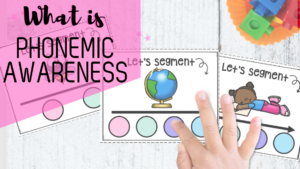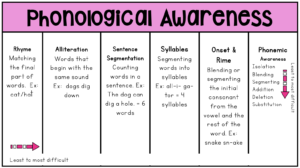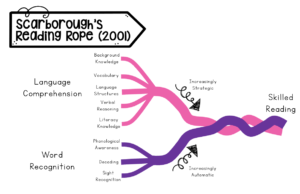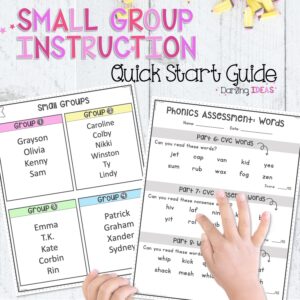Planning phonemic awareness activities for small group instruction is very important and can have a huge impact on your student’s reading ability. This is part one of a two-part phonemic awareness blog post series. Read on for some great, easy-peasy ideas for incorporating these activities into your small group time, but first, let’s look at exactly what phonemic awareness instruction is, and why it is so important.
![]()
What is Phonemic Awareness?


Phonemic awareness is a section of phonological awareness. Phonological awareness is working with sounds but it is WITHOUT print. (If you add in print, you are working on phonics skills.). Phonological Awareness works on bigger chunks of words, such as rhyming and syllables. There is a continuum of phonological awareness skills that help students become successful readers. Check out the chart below to learn more about the phonological continuum. I bet some of these skills like rhyming and breaking words into syllables are pretty familiar to you.


Phonological awareness skills are organized into a continuum of learning, The last part of the continuum is manipulating the syllables, onset, and rimes, and individual phonemes or sounds in words. This is called phonemic awareness. This is different than phonological awareness (the big umbrella) which words on bigger chunks of a word, such as rhyming and syllables.
This chart gives a good overview of the big picture, but it is important to know that each of the phonemic awareness components (isolation, blending, segmenting, addition, deletion, and substitution) also has three levels. Those levels are:
- Syllable Level
- Onset and Rime Level
- Individual Phoneme Level
I love this free “cheat sheet” by The Clever Classroom. The Clever Classroom breaks each section of the continuum into small chunks of skills and maps all that out on this chart. It is soo handy for planning out what individual skills to practice in small groups. We will talk more about what instruction looks like for the skills at each level in the next blog post. 🙂
Phonemic Awareness skills are essential and can be practiced without the mastery of early phonological awareness skills, according to recent research. Most likely, you have some whole group time for practicing those phonological awareness skills, therefore you can differentiate instruction and practice with phonemic awareness activities during small group time.
![]()
![]()
![]()
![]()
Why is Phonemic Awareness so important?
Check out Scarbrough’s Reading Rope below, to see how phonological awareness is essential for skilled reading.


Phonemic awareness falls into the Word Recognition part of Scarborough’s reading rope, and as you can see is just as important as decoding and sight recognition. These word recognition skills are typically the focus of primary literacy instruction. Primary instruction includes language comprehension skills, (read aloud anyone?) but word recognition skills are heavily taught in lower elementary grades.
Equipped for Reading Success, by David Kilpatrick is a great resource to support the science of reading instruction. This book has an incredible assessment as well as practice drills. The main reason I am mentioning it here is that Kilpatrick does an incredible job explaining why phonemic awareness instruction plays such a big role in skilled reading.
Kilpatrick also found in his research that “The most common source of reading difficulties is poor phonemic awareness.” According to Kilpatrick, readers who are not making adequate progress will be able to improve their reading skills if they are provided with science-based intervention to develop letter-sound proficiency and phonemic proficiency.
Equipped for Reading Success, by David Kilpatrick to take a deep dive into why phonemic awareness skills are so necessary.
I hope this helps you better understand Phonemic Awareness! I can’t wait to share how to use this information in instruction next!
![]()
![]()
![]()
![]()








No Comments